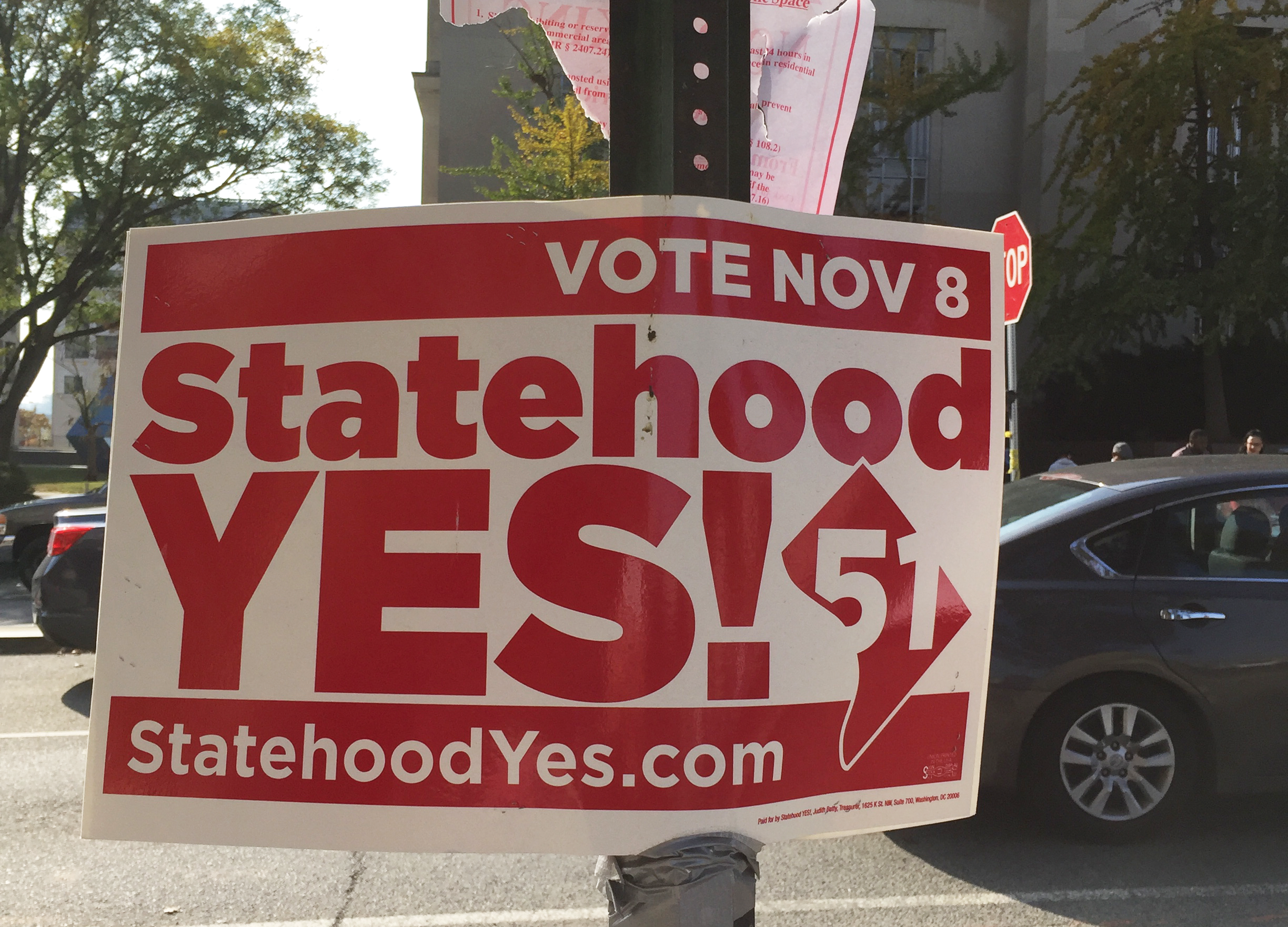
One of the measures D.C. residents are voting on in this election is a referendum on statehood for the District.
Tens of thousands of Washington, D.C. voters have broken the District’s early voting records to weigh in on the presidential election, local government races and a referendum to petition Congress to include D.C. as the 51st state.
Across the United States, 37 states and D.C. offer a form of early voting that does not require the voter to provide a reason for not waiting until Election Day next Tuesday. The District, along with 22 other states, allow for early voting on weekends.
According to D.C. Board of Elections Public Information Officer Tamara Robinson, the 2016 election season in D.C. has seen a record 14 percent early turnout among eligible voters, exceeding previous years’ averages hovering at 10 or 11 percent. As of Oct. 31, the D.C. Board of Elections listed 478,93 D.C. residents as registered to vote out of the total population recorded by the U.S. Census Bureau of 672,228.
According to the Associated Press, around 33 million votes nationwide, representing roughly one-quarter of total expected votes, have already been cast.
The polls opened at One Judiciary Square in downtown D.C. on Oct. 22 before expanding to sites in all eight wards Oct. 28, providing eligible residents a nearly two-week window before early voting closes Nov.
Off to the Races
The District has three electoral votes, all of which went to President Barack Obama in 2012 along with 90.9 percent of the popular vote.
Among the local elections, the Ward 7 seat on the D.C. Council is expected to go to former mayor Vincent Gray (D) over independents Gary Butler and Christian Carter. Gray’s election to the council seat would mark a comeback for the politico, who lost his reelection bid in 2014 to current Mayor Muriel Bowser (D) amid a federal corruption probe into the funding of Gray’s campaign.
Six candidates are vying for the council’s two at-large seats in play, with incumbent David Grosso (I) and Robert White (D) far outspending their opponents. The race features the only Republican candidate Carolina Celnik, a D.C. lawyer on the District ballot, excluding Republican presidential nominee Donald Trump and his running mate, Mike Pence.
The Ward 2, Ward 4 and Ward 8 elections feature two incumbents and one candidate running unopposed.
The State of the District
One of the most highly discussed items on the ballot is the referendum for D.C. statehood.
This July, the D.C. Council unanimously approved placing the measure on November’s ballot. If passed, the referendum would advise the council to petition Congress to admit D.C. as a state and initiate the process of approving a state constitution. Overall, the referendum boasts overwhelming support in D.C.
The most recent polling of District residents conducted by The Washington Post in November 2015 found that roughly 70 percent of voters were in favor of statehood.
Christopher Murphy, Georgetown’s government relations and community engagement vice president, said the referendum is highly significant.
“The referendum is important because it reminds our nation’s leaders — and indeed all Americans — about the injustice D.C. residents continue to suffer from,” Murphy wrote in an email to The Hoya. “To deny more than 670,000 American citizens the most basic of democratic rights because of where they live is un-American and unconscionable.”
Georgetown Institute of Politics and Public Service Executive Director Mo Elleithee said even if the statehood referendum passes, he does not expect Congress to support that decision.
“I don’t foresee there being any real movement towards statehood in a tangible way any time soon, especially if Republicans control the congress, because the Republican leadership in the House has been fairly steadfast in opposition,” Elleithee said. “Until there is a major change in Congressional leadership, you’re not going to see any real entertaining of the notion.”
McCourt School of Public Policy government professor Michael Bailey agreed that the idea would likely be opposed by Congress, blaming a largely Republican desire to keep representatives of the District — who are historically Democrats — out of congressional voting positions.
“The consequence would be we’d get a voting member in the House of Representatives, and I presume we’d get the two senators. We’d have normal statehood,” Bailey said. “They’d obviously be Democrats, and maybe some people don’t want more democrats in Congress.”
D.C. resident Jim Schank, who voted Wednesday at the One Judiciary Square polling location, said he was compelled to vote in favor of D.C. statehood because of the District’s current lack of representation.
“We need representation in both houses of Congress. D.C. has a larger population than some of those right-wing, Midwestern states like Wyoming, and it’s about fairness,” Schank said.
Though the statehood movement has considerable popularity, president of GU Students for D.C. Statehood Annie Mason (COL ’18) cited misinformation and assumptions about statehood as a challenge to the movement.
“People think it’s a more ceremonial transition from city to state and it doesn’t have any actually legal implications, when it fact it really does,” Mason said. “A challenge is people who think that it’s just D.C. making hullabaloo about nothing, when it really is rooted in civil rights and representation, especially for a geographic region that’s majority black and majority people of color.”
Nevertheless, Mason acknowledged that even if the measure passes, there are potential legal obstacles that could hamper a swift transition to statehood.
“It would be really difficult, in terms of legally implementing it. It would be really hard. It takes a Constitutional amendment, it takes action at a federal level and action that we’re not seeing in Congress right now in the state of congressional affairs,” Mason said.














